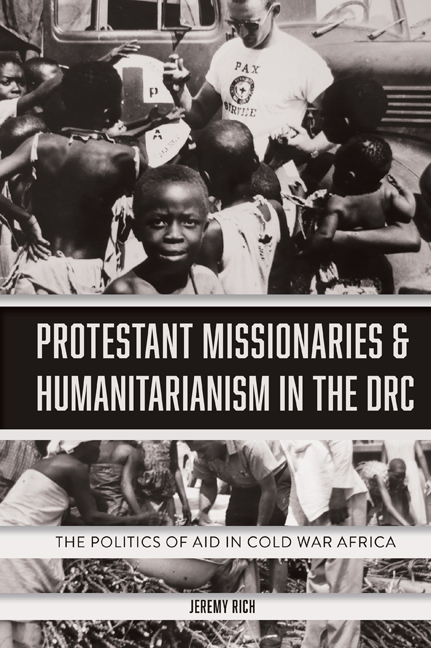Book contents
- Frontmatter
- Contents
- List of Illustrations
- Acknowledgements
- List of Abbreviations
- Introduction
- 1 The CPRA, Protestant Missions, and the Congo Crises, 1960–1965
- 2 The CPRA and Luba Refugees in South Kasai, 1960–1962
- 3 The CPRA and Angolan Refugees in the DRC, 1961–1967
- 4 The CPRA and the Simba Revolts, 1964–1967
- 5 Operation Doctor: The Rise and Fall of a Protestant Short-Term Medical Volunteer Programme
- 6 Protestant Volunteers and Medical Practice in the Congo in the 1960s
- 7 Changing Dollars into Zaires: The Challenges of a Humanitarian Aid NGO in the DRC, 1965–1973
- 8 The Centre for Community Development
- Conclusion
- Bibliography
- Index
3 - The CPRA and Angolan Refugees in the DRC, 1961–1967
Published online by Cambridge University Press: 11 September 2020
- Frontmatter
- Contents
- List of Illustrations
- Acknowledgements
- List of Abbreviations
- Introduction
- 1 The CPRA, Protestant Missions, and the Congo Crises, 1960–1965
- 2 The CPRA and Luba Refugees in South Kasai, 1960–1962
- 3 The CPRA and Angolan Refugees in the DRC, 1961–1967
- 4 The CPRA and the Simba Revolts, 1964–1967
- 5 Operation Doctor: The Rise and Fall of a Protestant Short-Term Medical Volunteer Programme
- 6 Protestant Volunteers and Medical Practice in the Congo in the 1960s
- 7 Changing Dollars into Zaires: The Challenges of a Humanitarian Aid NGO in the DRC, 1965–1973
- 8 The Centre for Community Development
- Conclusion
- Bibliography
- Index
Summary
In June 1961, Canadian pastor James Ormiston visited Angolan refugee settlements in the Bas-Congo province of the Democratic Republic of Congo. Three months earlier, rebel forces of the UPA (União dos Povos de Angola) had launched a surprise attack on Portuguese settlers in northern Angola. The Portuguese colonial government led a counter-offensive. Mission-educated intellectuals and poor farmers alike became the victims of the brutal crackdown by Portuguese settlers and solders. ‘I have had to face the fact that the Portuguese really are slitting children's throats and chopping the hands and feet and heads off people. It is a chilling realisation that so-called civilised people can sink so far down their own offal of self-pride and self-pity,’ Ormiston wrote to the United Church of Canada (UCC) mission board secretary. Ultimately, several hundred thousand Angolans fled to the Democratic Republic of Congo between 1961 and 1965.
This chapter focuses on the political dimensions of CPRA aid in its support of the UPA, later known as the FNLA (Frente Nacional de Libertação de Angola) from 1961 until 1967, when CPRA staff member David Grenfell retired. Grenfell committed himself to collaborating with FNLA leader Holden Roberto. Despite the ostensibly apolitical nature of the CPRA, Grenfell's meticulous monitoring of refugee movements from Angola to the DRC reinforced FNLA's control of Angolan people. The British missionary made Angolans legible as citizens of FNLA's government in exile through a complicated system of ration cards. In addition, he and other CPRA staff regulated how FNLA officials and soldiers gave out permits to refugees seeking to escape Angola. The CPRA also procured food and supplies for refugees under FNLA's administration. CPRA advocacy for FNLA extended to public relations abroad as Grenfell supplied favourable information about Roberto and his movement to international donor organisations and mission boards. Organisations such as the CWS (Church World Service) and the UCC funded relief for Angolan refugees. However, not all aid workers supported Grenfell's approval of Roberto. Ian Gilchrist, a Canadian doctor who worked directly for the FNLA rather than the CPRA, became embittered with the FNLA elite to the point Roberto tried to have Gilchrist arrested in June 1965. Other CPRA staff smuggled Gilchrist out of the DRC, even as Grenfell remained sympathetic to Roberto.
- Type
- Chapter
- Information
- Protestant Missionaries and Humanitarianism in the DRCThe Politics of Aid in Cold War Africa, pp. 83 - 107Publisher: Boydell & BrewerPrint publication year: 2020

